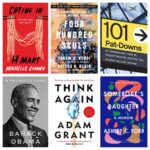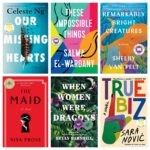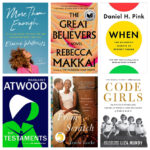Must-read books for 2024
Looking back, 2023 was pretty wretched. One bright spot? I hit my “read 100 books” goal for the first time! Praise be the Libby App, Goodreads, and audiobooks.
Below I’ve got my top 30 book suggestions, split between nonfiction and fiction, in no particular order. Short snippets about each book included. Notable mentions in fiction, nonfiction, fantasy, romance, YA and for the first time, kid’s lit follow. To see all my 2023 reads (and beyond), find me on Goodreads.
Must-Read Nonfiction
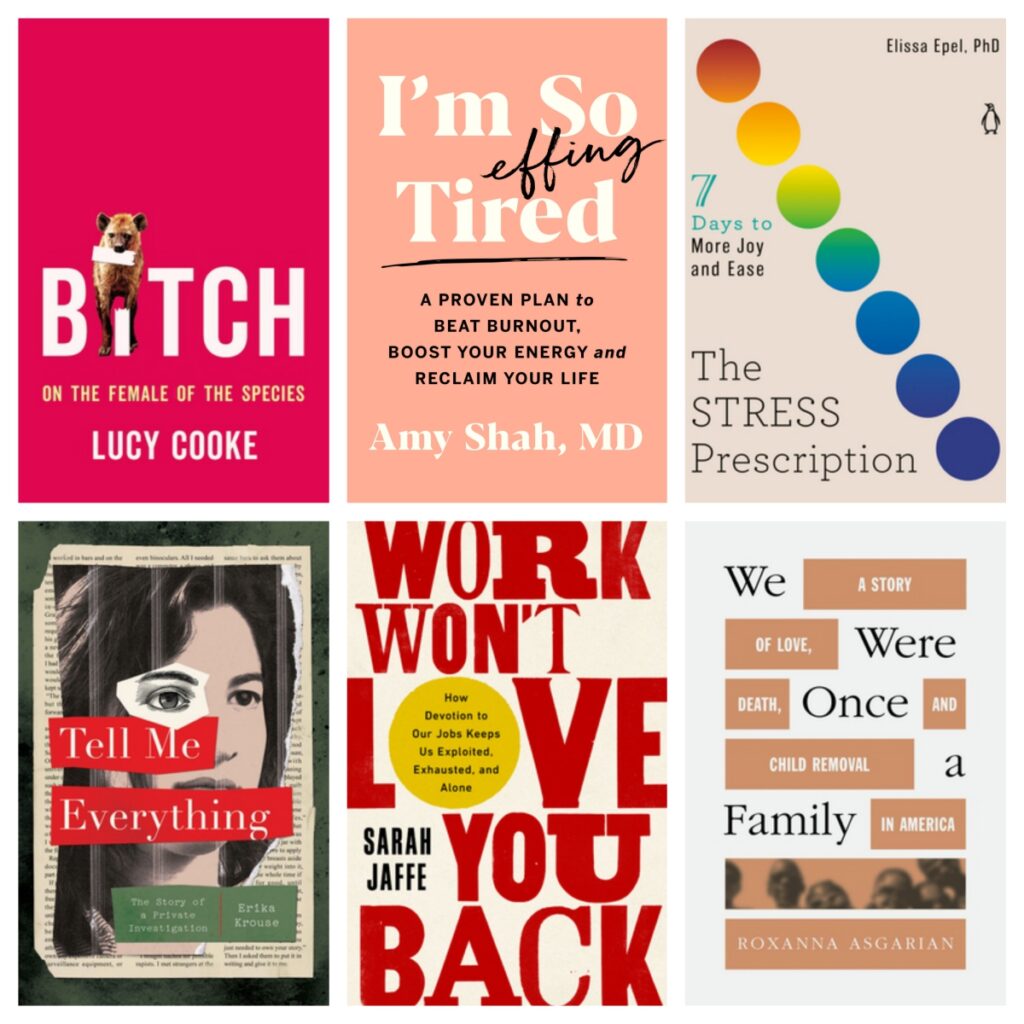
- Bitch: On the Female of the Species by Lucy Cooke. Want to be absolutely blown away by a biology book? Look no further. Cooke’s exposé on sexism in evolutionary science rocked my world. That Darwin and company unfairly propagated male dominance in science was not necessarily surprising—infuriating but not surprising. What was surprising: learning the myriad examples of the female perspective in nature that were not just about raising young or mating. The book was enlightening, understandable for a non-science person, and at times quite funny. I especially appreciated the concluding chapter where Cooke unravels the gender duality myth in nature.
- I’m So Effing Tired: A Proven Plan to Beat Burnout, Boost Your Energy and Reclaim Your Life by Amy Shah. Has a book ever just called out to your very soul? That was Dr. Shah for me this summer and her examination of burnout, primarily from a woman’s perspective. Dr. Shah offers comprehensive, whole-person health advice aimed at women to increase energy, balance hormones, and beat burnout. Her advice centers on increasing fiber and nutrition, getting enough rest, circadian fasting, and cultivating healthy habits. There are some more extreme suggestions (as a baker, I laughed at the “cut out sugar and flour” part), but on the whole, she encourages women to make adjustments that fit their lifestyles. I especially appreciated her focus on wellness, prioritizing rest, and conserving energy (emotional as well as physical). I feel called out, but in a good way.
- The Stress Prescription: 7 Days to More Joy and Ease by Elissa Epel. I loved this book so much, I bought it for my work besties, sister and self for Christmas. The format focuses on concrete, actionable ways to manage stress, and teaches one new strategy for seven days. I liked the mix of research-driven cognitive and physical practices known to cultivate resilience, as well as the accessible (short) format.
- Tell me Everything: The Story of a Private Investigation by Erika Krouse. Oh wow. Krouse’s Tell Me Everything was SPELLBINDING. Focusing on the true story of a college football recruiting and sexual assault scandal (circa early 2000s), Krouse narrates from her perspective as a private investigator working on behalf of one of the assault victims. Part true-crime tale and memoir, the book weaves together themes of sexual assault, corruption, and redemption. I knew a lot about this particular case because of the research of my dear friend Kate Lockwood Harris (see her brilliant book Beyond the Rapist: Title IX and Sexual Violence on U.S. Campuses) and appreciated the unique perspective of the PI.
- Work Won’t Love You Back: How Devotion to Our Jobs Keeps Us Exploited, Exhausted, and Alone by Sarah Jaffe. If there’s one book from this list that working folks need, it’s this one. Whoa. A journalist, Jaffe expertly examines how fixating on “doing what we love” is a recipe for exploitation. While many of her arguments were no surprise to me as a critical organizational communication researcher, I imagine they will be mindboggling to folks who aren’t steeped in work literature, especially those of us who were raised to find meaning and passion in our work. Jaffe’s analysis of internships, teaching and nonprofit work especially hit home, demonstrating how insidious ideas like “labors of love” and “callings” can undermine workers. It’s a sobering read but well worth it.
- We Were Once a Family: A Story of Love, Death and Child Removal in America by Roxanna Asgarian. Captivating, horrifying, and infuriating, We Were Once a Family traces the true story of the 2018 Hart family murder-suicide where a couple drove off a Northern California cliff with their six adopted children in the back. The book is a powerful and personal critique of the U.S. foster-care and child-protective systems that incentivize separating children from their families, especially children of color. Asgarian expertly analyzes how states like Texas generate extraordinary revenue by trafficking children to other states and how U.S. systems completely fail children and their families. This book is a necessary, albeit devastating read.
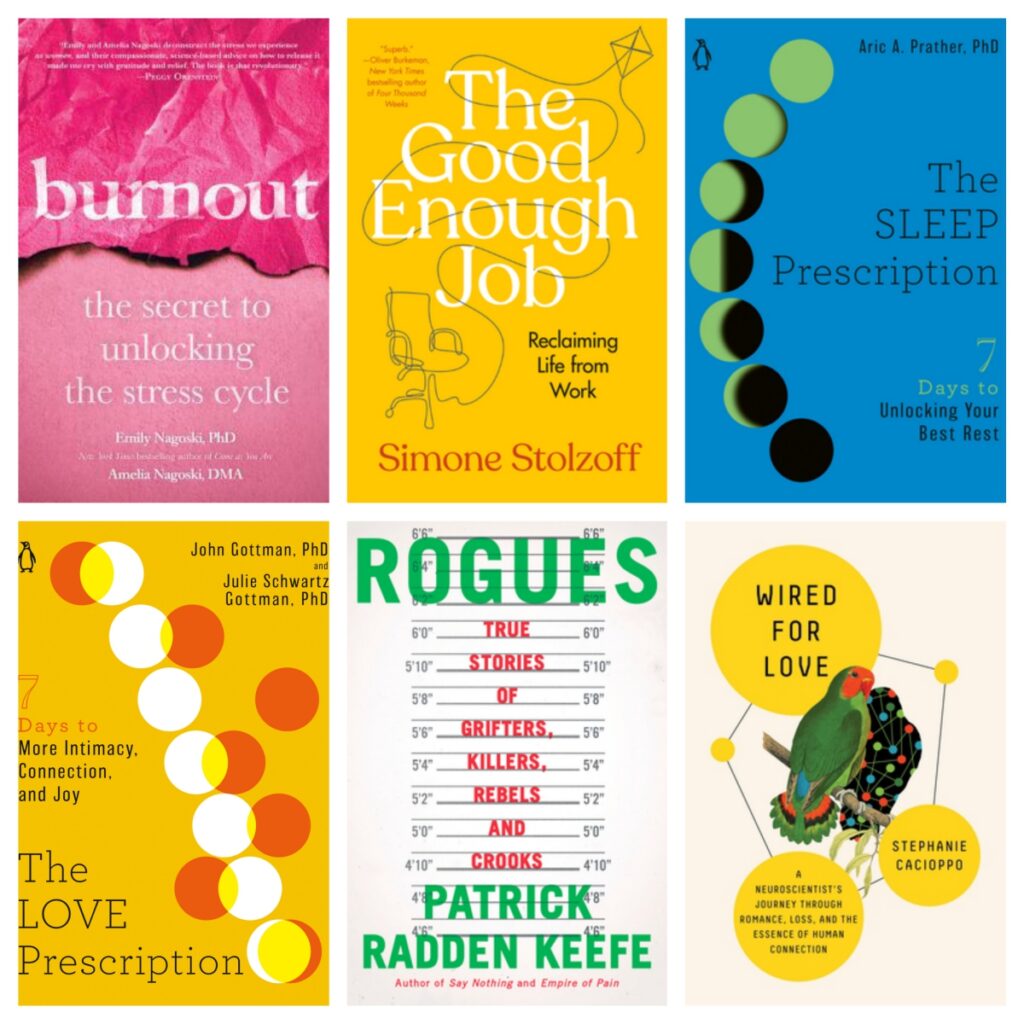
7. Burnout: The Secret to Unlocking the Stress Cycle by Emily Nagoski and Amelia Nagoski. At this point, you might be sensing a theme in my reading. Another book I needed to read years ago! The Nagoski sisters’ focus on reducing women’s burnout was like a love letter addressed just to me. They analyzed the competing discourses that make womanhood difficult, showing that societal pressures and structures set women up to fail. And moreover, that perpetual burnout is a life threatening social justice issue. Although some aspects of the book felt self-help cutesy, I deeply appreciated the authors calling out THE PATRIARCHY as a main problem while also offering research-driven suggestions for battling burnout. (In the audio version, every time the narrator says “patriarchy,” she mumbles “Ugh.” It’s hilarious.) What sets this book apart from other burnout books I’ve read lately: The focus on the biological stress cycle and how to complete it, and therefore reduce stress and ultimately burnout. I loved the explicitly feminist viewpoint and clear discussion of the cultural context that informs stress and burnout for women. After listening to the audiobook from my library, I purchased the accompanying workbook which has really helped me practice completing stress cycles and not be as overwhelmed by stress. DEFINITELY recommend for any working person, especially women.
8. The Good Enough Job: Reclaiming Life From Work by Simone Stolzoff. This book reminded me of Work Won’t Love You Back, but from a more personal perspective. Stolzoff profiles workers from across industries and illustrates the perils of locating meaning, identity, and love in our work. It’s a short read and one that advocates strongly for us to stop focusing on work as our primary source of value.
9. The Sleep Prescription: 7 Days to Unlocking Your Best Rest by Aric A. Prather. Admittedly, this book was not for me. I’m that asshole who falls asleep as soon as my head hits the pillow and usually stays asleep all night long. But I’m reading the entire 7 Days series and sleep was next. If you struggle with sleep, this book offers concrete and helpful suggestions for getting better rest.
10. The Love Prescription: 7 Days to More Intimacy, Connection and Joy by John Gottman and Julie Schwartz Gottman. If you’re in a long term romantic relationship, this book is for you! As a sometime dabbler in interpersonal communication research, I was familiar with the Gottmans, especially their research about the precursors of divorce (the Four Horsemen—criticism, contempt, defensiveness and stonewalling). I loved this easy read that emphasized humble but profound ways to connect with your partner.
11. Rogues: True Stories of Grifters, Killers, Rebels and Crooks by Patrick Radden Keefe. This book was a departure for me and an enjoyable one. Rogues is a collection of Radden Keefe’s articles from The New Yorker featuring wild true tales of wine forgery, money laundering, drug cartels, and more. I was particularly entranced by the profile of Anthony Bourdain; the analysis of Mark Burnett—showrunner of the Apprentice—and his role in getting Trump elected; and a feature about a death row attorney, which challenged my thinking about the death penalty.
12. Wired for Love: A Neuroscientist’s Journey Through Romance, Loss, and the Essence of Human Connection by Stephanie Cacioppo. Pull out your tissue box for neuroscientist Stephanie Cacioppo’s memoir about love and loss. The book follows Cacioppo’s life and career studying romance and love, without ever having experienced them herself. Until, that is, she meets renowned neuroscientist John Cacioppo, who founded the field of social neuroscience and studied the dangers of loneliness. The book shares a lot of scientific information about the brain (but isn’t too dry or technical, thankfully!) and as the title suggests, offers evidence of how we are hardwired for human connection. Overall, it was a moving and motivating book. Aside from the personal story, I appreciated all of the suggestions she offered for managing connections—romantic and otherwise.
Must-Read Fiction
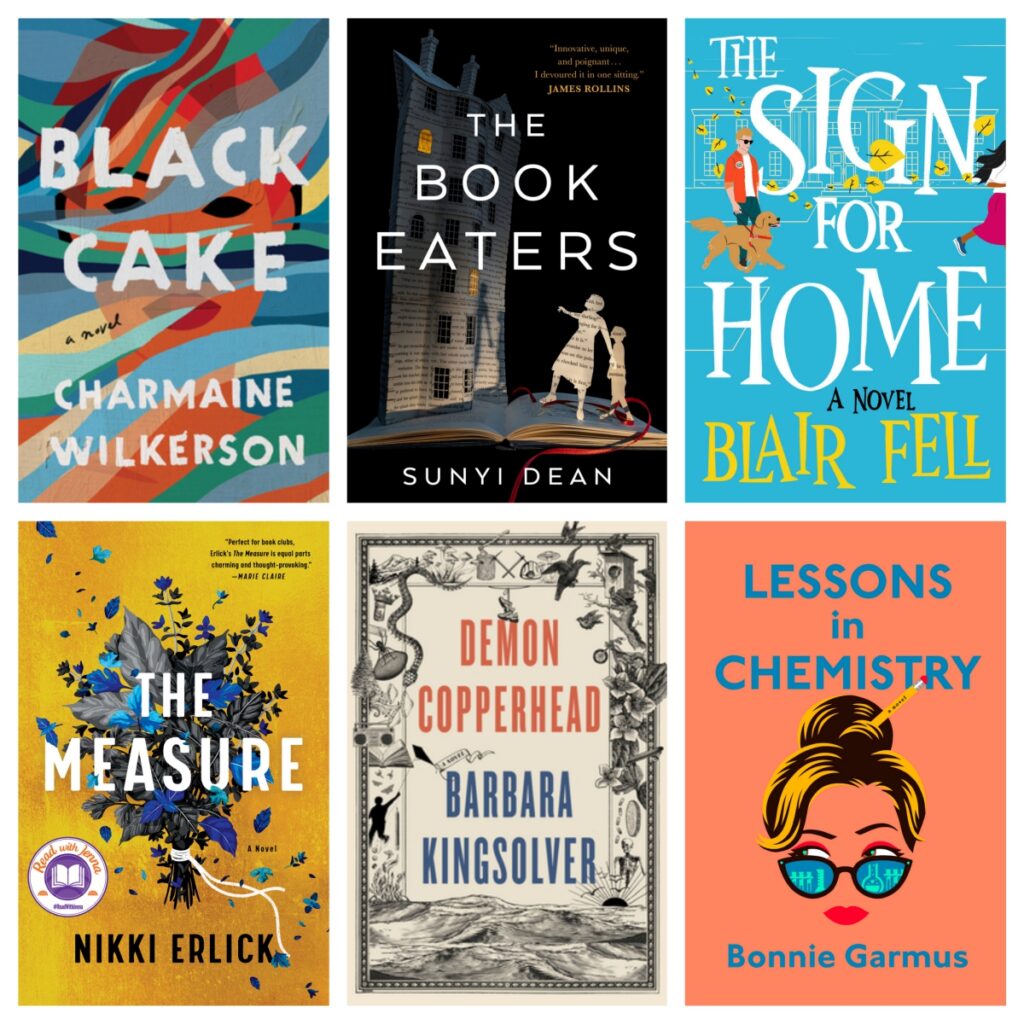
13. Black Cake by Charmaine Wilkerson. Part mystery, part family saga, part heartbreaking historical journey, Black Cake is a beautiful, difficult read. It follows the Bennett family. We learn early on that estranged siblings Byron and Benny are navigating their mother Eleanor’s death and all of the complicated feelings of loss. Only as the story unfolds, the siblings and readers learn unsettling truths about Eleanor’s past, shared through a recording she made shortly before she died. It sounds bleak, but the book itself is riddled with love and relational bonds that transcend time and distance. I loved it.
14. The Book Eaters by Sunyi Dean. RIVETING. Creative, disturbing premise that called to mind questions about how people consume/absorb knowledge, use knowledge to control/subdue certain people, and navigate emotionally complex paradoxes. How do they do all this? By EATING BOOKS. Few plot details here to avoid spoilers. One of my favorite reads of 2023, hands down.
15. The Sign for Home by Blair Fell. L-O-V-E-D this book. It combined my penchant for a good love story, the intrigue of a secret religious society, and learning about unique life experiences like the DeafBlind community. The book follows Arlo Dilly, a young, Deafblind, Jehovah’s Witness who lives under the strict control of his overbearing uncle. The story shows Arlo’s perseverance seeking education in a sighted/hearing world, as well as his adventures with his curmudgeonly interpreter. The ending requires suspending belief, but I loved every second of the book.
16. The Measure by Nikki Erlick. If you could learn the length of your life, would you? That was the question at the heart of The Measure, one that every person on earth had to answer once wooden boxes with various lengths of string started showing up on people’s doorsteps. Each string came with a name tag and no other detail. The world soon realized the string correlated to the length of one’s life. I absolutely loved this novel and how it forced the reader to contend with how we value life and prioritize certainty over reason. The inherent conflicts between short stringers and long stringers are heartbreaking, especially set in a political context that seems way too toxic and familiar. One of my favorite reads of late.
17. Demon Copperhead by Barbara Kingsolver. I couldn’t put this one down. A retelling of Dickens’ David Copperfield set in Appalachia, Demon Copperhead is beautifully written albeit tense, graphic, and heartbreaking. Kingsolver’s linguistic styling hits exactly right for me—I fell in love with her dialogue and creative turns of phrase. I could’ve done without some of the stereotyping of white rural poverty though. It’s not the most uplifting or fun read, but a gripping one.
18. Lessons in Chemistry by Bonnie Garmus. If you haven’t read this one yet, what are you waiting for?? And no, watching the Apple TV show isn’t enough. Oh, I loved this book. It enraged me, of course, as all books set in the 50s/60s seem to do—the ways that women are subjugated and harassed is absolutely exhausting. But the main character, chemist Elizabeth Zott, is a dream. No nonsense, unintentionally hilarious, career driven, she navigates work, love, loss, parenthood, and fame with aplomb. And shoutout to 6:30 (if you know, you know).
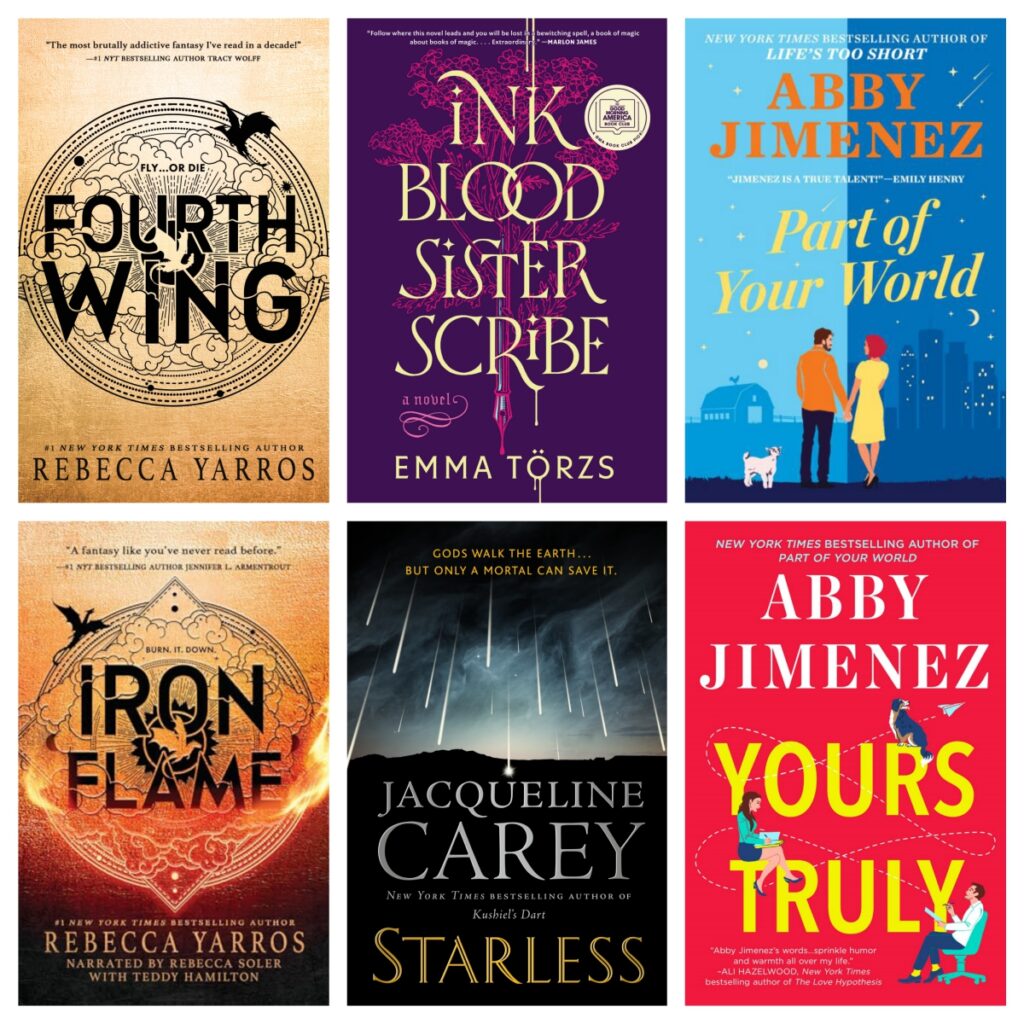
19. and 20. Fourth Wing and Iron Flame by Rebecca Yarros. Did you hear me screaming in December, Rebecca? When you ROYALLY CLIFF HANGED ME AND RUINED CHRISTMAS!? Okay, she didn’t ruin Christmas but she did make be absolutely anxious for the next installment of the Empyrean fantasy series. I inhaled both of Yarros’s books during the holidays—basking in the adventures of dragon riders, magic, love and lust, and friendship. I love a bookworm-turned-hero tale, with complex characters and minimal reliance on gendered tropes. If you liked Divergent, Hunger Games, and the A Court of Thorns & Roses books, these are for you. (So far, they’re definitely less steamy than Sarah Maas with a fair amount of sanctioned youth-on-youth murder.)
21. Ink, Blood, Sister, Scribe by Emma Törzs. Murderous magic books. Estranged sisters. Deadly family secrets. Ink, Blood, Sister, Scribe gave all that and more—I didn’t want it to end. Törzs is a deft storyteller who created complicated, endearing, diverse characters. I appreciated the interwoven storylines and perspectives, the subtlety in revealing the mysteries. It is a violent read in places but not overwhelmingly so.
22. and 23. Part of Your World and Yours Truly by Abby Jimenez. If you need a charming, heartwarming, laugh-out-loud funny romance series, look no further. Abby Jimenez is a master class in writing non-cringey romance stories that make me laugh, cry, and think. In addition to the usual steamy love story, these two shed light on the subtleties of spousal emotional abuse, family pressure, and anxiety, respectively. Her characters have tons of chemistry, whether love interests or friends. I can’t wait for the next installment.
24. Starless by Jacqueline Carey. I don’t quite know how to describe this epic fantasy tale of a warrior trained nearly from birth to protect his “soul’s twin,” the royal princess. The book features gods walking the earth, prophecy seekers, fantastic creatures, love, loss, and the enduring themes of identity and honor. It’s a stand-alone book with tender but strong characters that stay with you. Loved it.
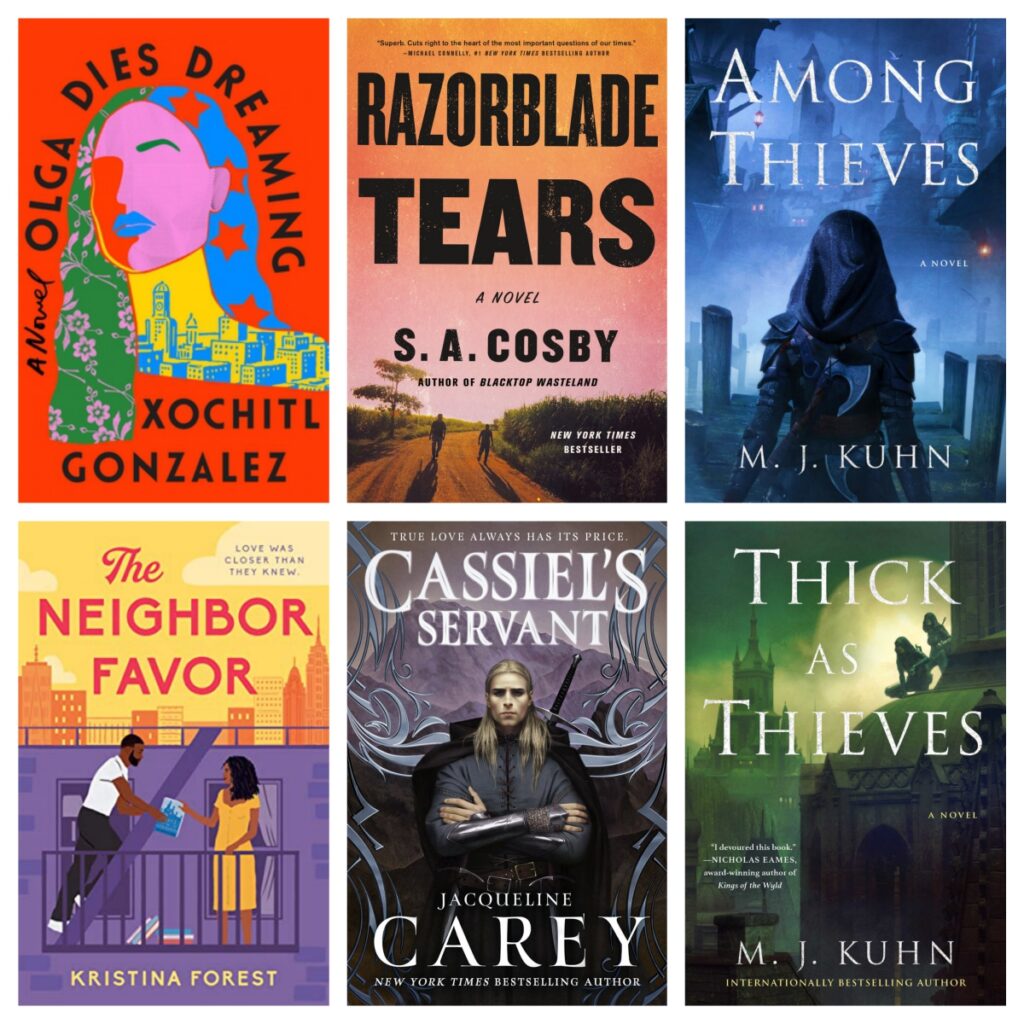
25. Olga Dies Dreaming by Xóchitl González. I really loved this book. Main character Olga Acevedo is the daughter of a Puerto Rican revolutionary. After college, Olga becomes wedding planner to the New York elite, while struggling with her own love life and complex family history. Her brother Pedro “Prieto” Acevedo is a congressperson working to advocate for his Brooklyn constituency while navigating his sexuality in the public eye. Following these siblings and their family sagas, the reader learns about the complicated history and continued subjugation of Puerto Rico; the long-term impacts of child abandonment; Puerto Rican activism; political corruption; and the profound bond between siblings. I found myself rooting for Olga and Prieto, and enjoyed being in their world for awhile (drama aside!).
26. Razorblade Tears by S.A. Crosby. When Ike and Billy Lee’s sons are murdered, these fathers-in-law form an unlikely partnership to find the killer(s). Both former residents of the criminal justice system, Ike and Billy Lee are willing to do anything to solve their sons’ murders, as well as punish the people ultimately responsible. Razorblade Tears is a raw, violent story, but one about love, family, chosen family, and redemption. Woven throughout are themes about LGBTQ+ phobia, racism, toxic masculinity, and Southern pride, as both Ike and Billy Lee come to terms with their relationships to their sons and the mistakes they both made. It was a difficult but compelling read, and I couldn’t put it down.
27. and 28. Among Thieves and Thick as Thieves by M.J. Kuhn. If you like fantasy stories with pirates, magic, swashbuckling adventures, backstabbing thieves, assassins, a touch of romance and a bunch of complicated loyalties, this duology is for you. These heist books feature morally ambiguous characters you can’t help but care for (most of them anyway!).
29. The Neighbor Favor by Kristina Forest. I’m a sucker for a book about writers. This one features Lily, her neighbor Nick, and a mysterious British fantasy author and former travel journalist, NR Strickland. Shy Lily is an aspiring children’s book editor who is stuck under a bad boss in the nonfiction division and needs a date to her sister’s wedding. She flirts with both Nick and NR via reading recommendations. Antics ensue. It’s a convoluted but bookish love story.
30. Cassiel’s Servant by Jacqueline Carey. There’s something magical and maddening about your favorite fantasy author putting out a new book in the series TWENTY TWO YEARS after the first one, the week before school starts. Class prep took a backseat in the fall while I devoured Cassiel’s Servant, which is a retelling of Kushiel’s Dart from Joscelin’s point of view. If this makes zero sense to you, please do yourself a favor. Stop here and start reading Kushiel’s Dart. Fall in love with Phedre and Joscelin, and then read Cassiel’s Servant and have your heart broken all over again. Sigh.
Other Notable Reads
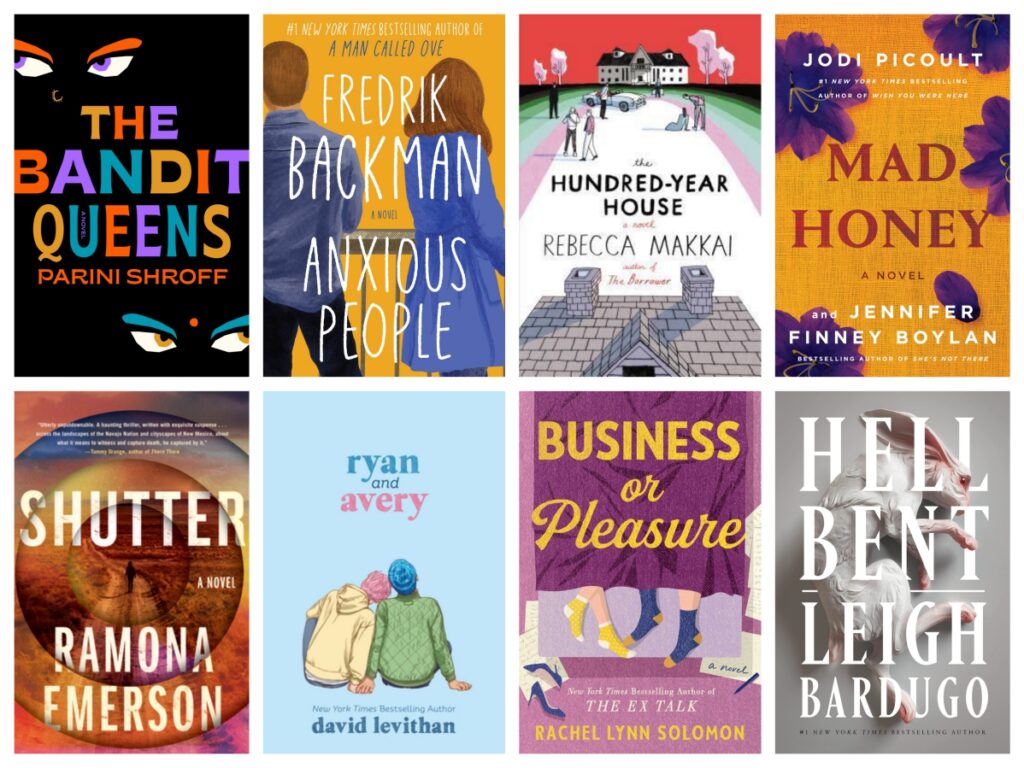
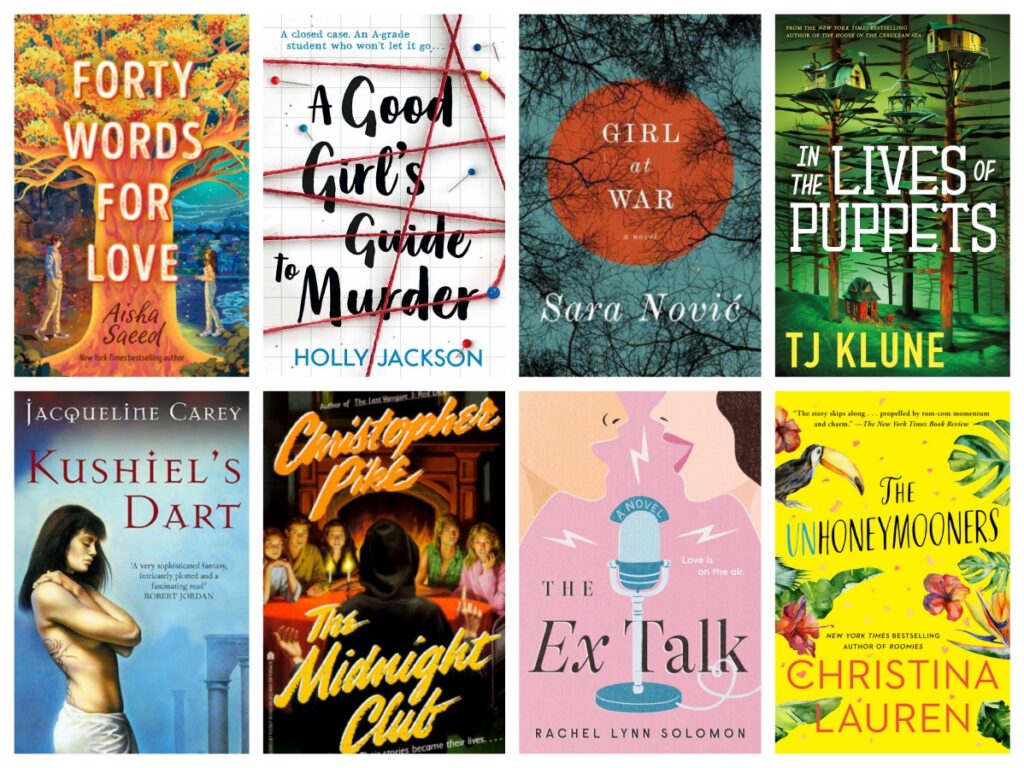
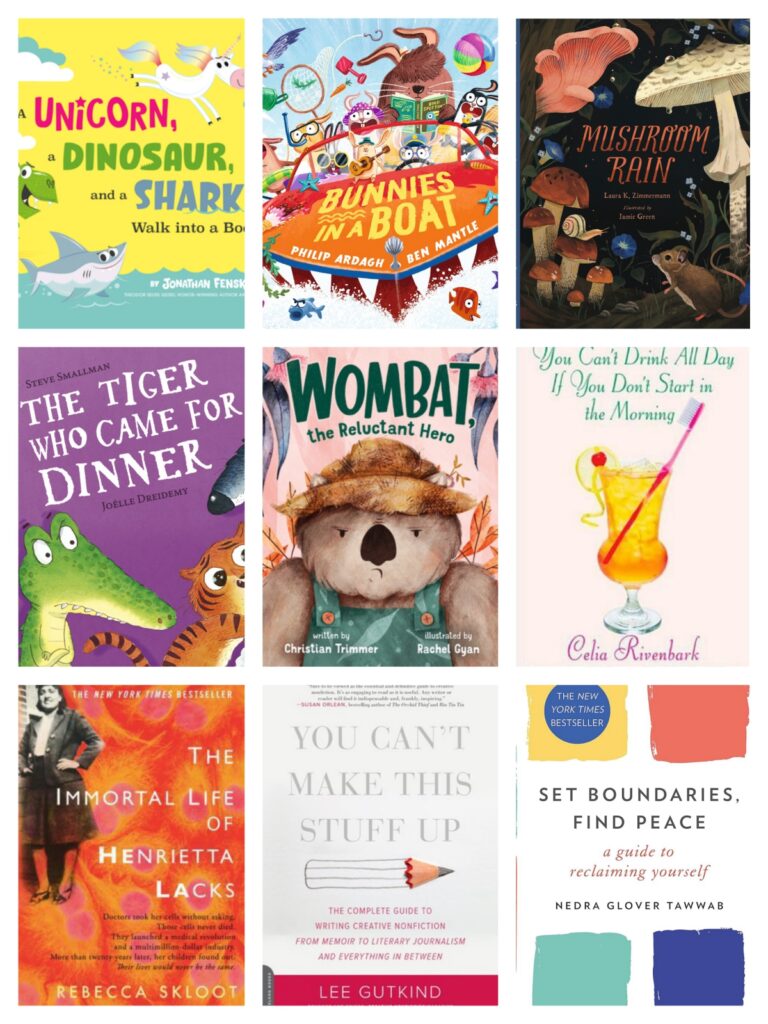
Looking for more books?
- Must read books from 2022
- Must-read books from 2021
- 2020 Reading Report so far: Must-read books (and a few to avoid)
- 2020 Reading Report, Part II: Must-read nonfiction
- 2020 Reading Report, Part III: Must-read fiction
- I read 85 books in 2019. Here are my top 24.
- I read 79 books in 2018. Here are the best and worst.
